Stock market news for investors: Cineplex, Roots, Delta and more
Cineplex, Roots, Corus Entertainment, Cogeco and Delta Air Lines reported earnings this week. Here are the details for Canadian investors.
Advertisement
Cineplex, Roots, Corus Entertainment, Cogeco and Delta Air Lines reported earnings this week. Here are the details for Canadian investors.

Build your retirement savings with 2.00% interest, tax-deferred contributions and zero fees.

Earn a guaranteed 3.45% in your RRSP when you lock in for 1 year.

See our ranking of the best RRSP accounts and rates available in Canada.
MoneySense is an award-winning magazine, helping Canadians navigate money matters since 1999. Our editorial team of trained journalists works closely with leading personal finance experts in Canada. To help you find the best financial products, we compare the offerings from over 12 major institutions, including banks, credit unions and card issuers. Learn more about our advertising and trusted partners.
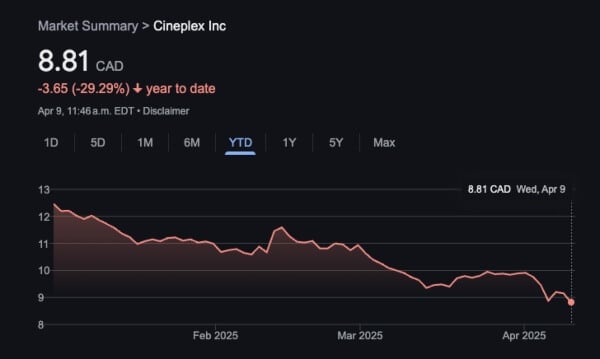
Cineplex Inc. says its box office revenue for March totalled $29.5 million, down from $59.2 million a year earlier when its results were powered by Dune: Part Two and Kung Fu Panda 4.
The movie theatre company says the results for March this year were led by Disney’s Snow White and Mickey 17.
For the first quarter of 2025 as a whole, Cineplex says its box office take totalled $101.9 million.
The result was down from $125.1 million in the first quarter of 2024.
Cineplex said the second quarter began with a strong debut by A Minecraft Movie.
It added that the quarter is also expected to see the release of Thunderbolts, Mission Impossible – The Final Reckoning, Karate Kid: Legends and the live-action adaptations of Lilo & Stitch and How to Train Your Dragon.
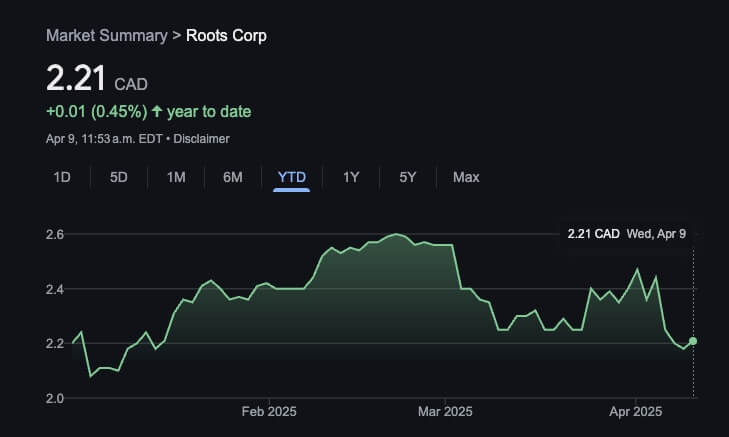
Roots Corp. says tariffs likely won’t have much of a direct effect on its business, but could weigh on consumer confidence.
Meghan Roach, chief executive of the Toronto-based apparel company, said the business has “limited exposure” to the tariffs U.S. President Donald Trump has levied on more than 180 countries.
“We have a relatively small business in the U.S. market and so we’re not seeing any significant impact on our business thus far,” she told analysts on a Wednesday call.
“From a consumer perspective, obviously we are looking to see what happens in Canada over the longer term.”
Roach’s remarks come as Trump’s tariff assault on the world has roiled stock markets, scuttled corporate expansion plans and pushed some companies to lay off staff as they try to keep their businesses alive.
For the fashion industry, Trump’s tariffs stand to upend supply chains because they make it more expensive to move materials and inventory around the world.
Beyond the duties he hit Canada with, the U.S. imposed tariffs on countries like Bangladesh, China, India, Indonesia and Taiwan where many companies make garments and accessories because of their lower labour costs.
While the latest rounds of tariffs don’t impede goods moving between those countries and Canada, domestic brands that ship supplies and stock directly to their U.S. stores from those countries are affected.
According to its website, Roots only has two stores in the U.S. and produces leather goods like handbags, backpacks and jackets at a Toronto facility.
Some of its clothing is sourced from countries in Asia and Europe, but the company does not disclose how much comes from each region, Roach said in an email to The Canadian Press.
“Given that we ship all of our goods to Canada, these products are not impacted by the tariffs set out by the U.S. on other countries,” she wrote.
Its Canadian heritage also makes Roots more likely to benefit from the growing wave of shoppers supporting domestic businesses.
So far, Roach said the movement has boosted searches for products on the company’s website, but it’s hard to parse out how many of the company’s recent wins stem from the buy Canadian sentiment.
“What we saw was momentum in the Q4 period continuing into Q1, so it’s very difficult for us to tell specifically what any uplift might be from Buy Canada as opposed to our businesses continuing to trend well out of the fourth quarter,” Roach said on the analyst call.
Roots said Wednesday that its fourth-quarter total sales amounted to $110.8 million, up from $108.2 million in the same quarter last year.
Direct-to-consumer sales for the period ended Feb. 1 totalled $101.2 million, up from $97.8 million a year ago, while partner and other sales amounted to $9.6 million, down from $10.5 million.
Roach attributed some of the bumps to new marketing initiatives and artificial intelligence-based inventory management.
They and a $50-million impairment charge on intangible assets, which Roach said was a non-cash accounting adjustment, contributed to a quarter that saw Roots incur a loss of $21.7 million or 54 cents per share.
The result compared with a profit of $14.6 million or 36 cents per share a year earlier.
On an adjusted basis, Roots earned 40 cents per share in its latest quarter compared with an adjusted profit of 36 cents per share a year earlier.
Given that apparel businesses plan so far in advance, Roots also had confidence in how it will handle fall and winter.
The merchandise stocked at these times of year tends to include products it can push year-round, so inventory “won’t go bad at the end of the season,” Roach said.
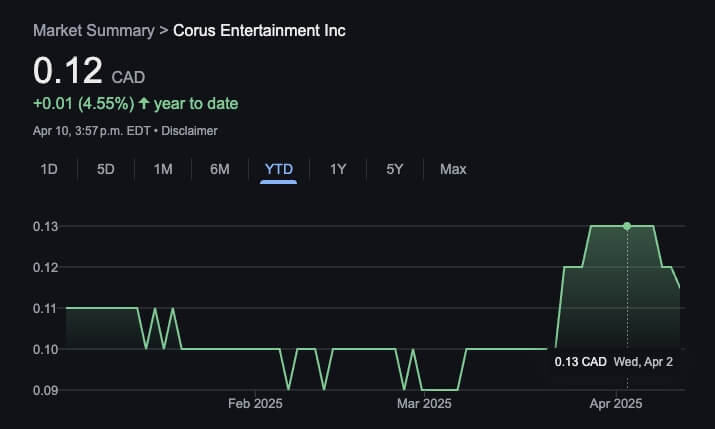
Corus Entertainment Inc. reported a loss in its second quarter as its revenue fell 10% compared with a year ago.
The television and radio broadcaster says it saw a loss attributable to shareholders of $55.9 million or 28 cents per diluted share for the quarter ended Feb. 28.
The result compared with a loss of $9.8 million or five cents per share in the same period a year earlier.
Revenue totalled $270.4 million for the quarter, down from $299.5 million.
The drop came as Corus reported $251.8 million in television revenue, down from $278.1 million a year earlier, while radio revenue amounted to $18.5 million, down from $21.5 million.
On an adjusted basis, Corus says it lost 21 cents per share in its latest quarter compared with an adjusted loss of three cents per share a year ago.
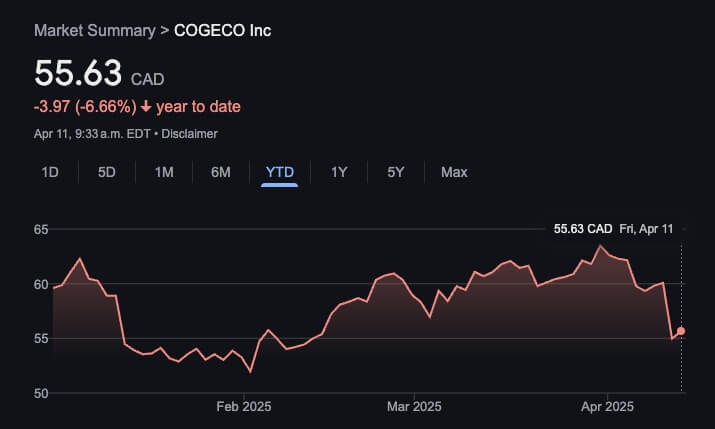
Cogeco Inc. reported a profit attributable to shareholders of $18.2 million in its second quarter, down from earnings of $24.0 million during the same period a year earlier.
Revenues for the quarter ended Feb. 28 were $753.2 million, slightly up from $751.9 million during the same quarter in 2024.
Meanwhile, Cogeco’s cable and internet subsidiary says profit attributable to shareholders was $74.7 million, down about 20 per cent from $93.7 million.
Cogeco Communications Inc. says its revenue for the second quarter was $732.4 million, slightly up from $730.5 million.
Frédéric Perron, president and CEO of both, says the results show the company’s new operating model is gaining traction.
He said internet subscriber growth in Canada remained strong, with modest improvements in internet subscriber metrics in the U.S.
Cogeco Inc. says its plans to offer mobile service in Canada are on track and it has begun signing up customers who already subscribe to its other services.
President and CEO Frédéric Perron told analysts on the company’s second-quarter earnings call Thursday that Cogeco’s wireless launch preparations are “progressing well” and demand has exceeded expectations since opening up pre-registrations for existing Canadian wireline customers.
The Montreal-based telecommunications company has teased plans to launch wireless coverage across its broadband footprint in Ontario and Quebec in the coming quarters, but hasn’t provided an exact timeline.
Last year, it began offering wireless service under its Breezeline Mobile brand to customers in 13 U.S. states where it already offered broadband internet services.
Perron says subscriber growth in the U.S. has started ramping up, helping it reduce churn on its wireline business.
Cogeco reported a profit attributable to shareholders of $18.2 million in its second quarter, down from earnings of $24 million during the same period a year earlier.
(All figures in U.S. dollars.)
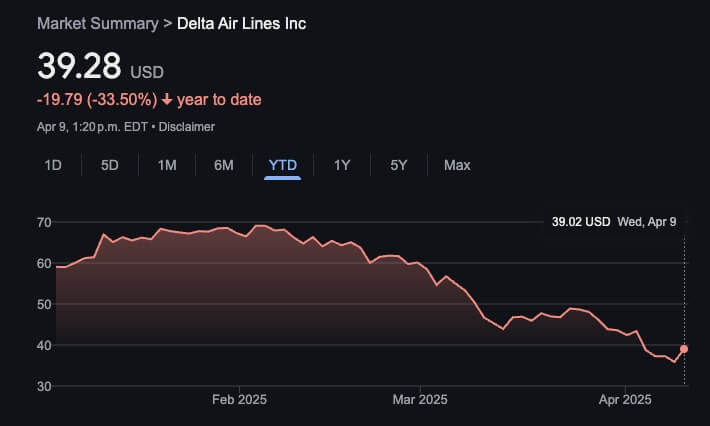
Delta Air Lines, which believed as recently as January that it was on track for its best financial year in company history, said Wednesday that disruptions in global trade have created such enormous uncertainty that it scratched its performance expectations for 2025.
It is a remarkable walk-back for the nation’s most profitable airline, and other companies are following suit. Hours after Delta remove its guidance for the year, Walmart dropped the first quarter operating profit guidance it had provided to investors, citing tariff risks.
Delta is cutting its flight schedule in anticipation of a slowdown in spending as businesses and households brace for higher prices.
“With broad economic uncertainty around global trade, growth has largely stalled,” CEO Ed Bastian said in a statement on Wednesday. “In this slower-growth environment, we are protecting margins and cash flow by focusing on what we can control. This includes reducing planned capacity growth in the second half of the year.”
In the first quarter, Delta earned $240 million, or 37 cents per share. A year earlier it earned $37 million, or 6 cents per share, when profit was weighed down by a new contract with pilots. (All figures in U.S. dollars.)
Stripping out one time costs and benefits, earnings were 46 cents per share. That’s better than the 40 cents per share analysts polled by Zacks Investment Research predicted.
Shares of Delta Air Lines Inc. rose more than 8%. Citi analysts suggested Delta may be the best airline with which to ride out the uncertainty in coming months for investors who want to maintain exposure to the travel sector.
“Overall, these results show a carrier with a resilient business model, in light of significant uncertainties around demand and the global tariff controversy,” Stephen Trent of Citi Investment Research wrote in a note to clients.
Still, the sector has been battered this year as investors, anticipating trouble from rising tariffs, put their money elsewhere. Shares are down 41% this year for the nation’s most profitable airline, which is better than rivals American and United.
Quarterly operating revenue climbed to $14.04 billion from $13.75 billion, beating Wall Street’s estimate of $13.81 billion.
The average fuel price per gallon declined to $2.47 from $2.79.
Delta cut its first-quarter earnings and revenue outlook last month, saying at the time that a recent decline in consumer and corporate confidence amid growing uncertainty over the economy was weakening domestic demand.
Delta said in March that it expected first-quarter revenue to rise between 3% and 4% compared with a year earlier, down from projections of 7% and 9%.
In January, Delta released fourth-quarter results that topped Wall Street’s profit and revenue estimates, as the company benefited from strong demand during the crucial holiday period.
Yet conditions have deteriorated since then with a burgeoning trade war leaving consumers and businesses unsure about what comes next. Both have begun to pull back on spending, and that includes travel.
Bastian said Delta foresees June quarter profitability of $1.5 to $2 billion but will not update its full-year outlook “given the lack of economic clarity.”
The airline previously said that it expected 2025 earnings of more than $7.35 per share and free cash flow of more than $4 billion. At the time the company was expecting strong travel demand to continue, and that has clearly changed.
A month ago Bastian was confident enough to stick by Delta’s guidance for the year. Speaking at the JPMorgan Industrial Conference, the executive said at the time that Delta was feeling good about where it was at.
“There’s nothing that we’ve been through these last couple of months to indicate there’s any cracks in any of this,” he said. “We anticipate margins continuing to expand and we think margins will expand this year, even with the slower start to the year.”
Yet uncertainty over U.S. trade policy has rattled companies in every economic sector since then.
Bastian said during Delta’s earnings call on Wednesday that the airline is seeing softness in domestic consumer and business travel given all of the uncertainty. There’s been greater resilience in the international market so far, he added.
Bastian maintained that given current fuel prices and actions being taken, Delta is “well positioned to deliver solid profitability and meaningful cash flow in 2025.”
For the second quarter, the airline is looking for earnings between $1.70 and $2.30 per share, with total revenue down 2% to up 2%. Analysts surveyed by FactSet predict earnings of $2.21 per share.
“2025 is playing out differently than we expected at the start of the year,” Delta President Glen Hauenstein said. “As a result, we are adapting to current conditions while staying true to our long-term strategy.”
Share this article Share on Facebook Share on Twitter Share on Linkedin Share on Reddit Share on Email